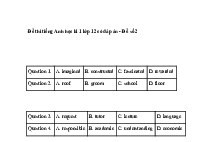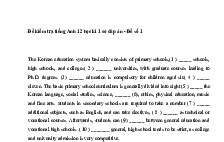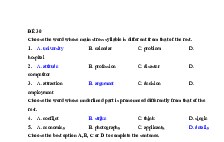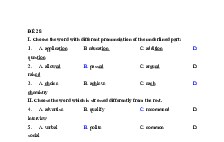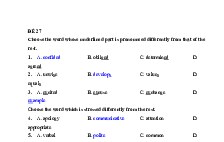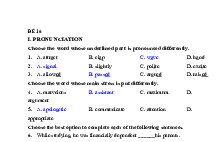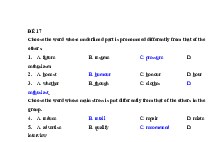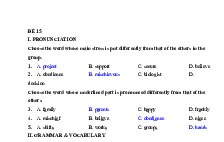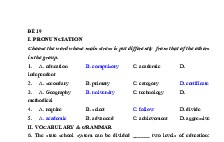Đề thi Tốt nghiệp THPT môn Tiếng Anh năm 2021 mã đề 409
Nội dung tài liệu
Tải xuốngCác tài liệu liên quan
-
![Đề thi học kì 1 Tiếng anh lớp 12 năm 2020-2021 ĐỀ SỐ 2]()
-
![Đề thi học kì 1 Tiếng anh lớp 12 năm 2020-2021 ĐỀ SỐ 1]()
-
![Đề thi học kì 1 Tiếng anh lớp 12 năm 2020-2021 ĐỀ SỐ 30]()
-
![Đề thi học kì 1 Tiếng anh lớp 12 năm 2020-2021 ĐỀ SỐ 28]()
-
![Đề thi học kì 1 Tiếng anh lớp 12 năm 2020-2021 ĐỀ SỐ 27]()
-
![Đề thi học kì 1 Tiếng anh lớp 12 năm 2020-2021 ĐỀ SỐ 29]()
-
![Đề thi học kì 1 Tiếng anh lớp 12 năm 2020-2021 ĐỀ SỐ 16]()
-
![Đề thi học kì 1 Tiếng anh lớp 12 năm 2020-2021 ĐỀ SỐ 17]()
-
![Đề thi học kì 1 Tiếng anh lớp 12 năm 2020-2021 ĐỀ SỐ 15]()
-
![Đề thi học kì 1 Tiếng anh lớp 12 năm 2020-2021 ĐỀ SỐ 14]()
Có thể bạn quan tâm
Thông tin tài liệu
BỘ GIÁO DỤC VÀ ĐÀO TẠO KỲ THI TỐT NGHIỆP TRUNG HỌC PHỔ THÔNG NĂM 2021
ĐỀ THI CHÍNH THỨC Bài thi: NGOẠI NGỮ; Môn thi: TIẾNG ANH
(Đề thi có 04 trang) Thời gian làm bài: 60 phút, không kể thời gian phát đề
![]() Họ,
tên thí sinh
..............................................
Mã
đề thi 409
Họ,
tên thí sinh
..............................................
Mã
đề thi 409
Số báo danh: .................................................
Mark the letter A, B, C, or D on your answer sheet to indicate the sentence that best completes each of the following exchanges.
Question 1: Mai is talking to Hoa about Hoa’s new dress.
~ Mai: “You’ve got a nice dress. Hoa."
~ Hoa:“……..”
A. No problem. B. Congratulations! C. Me too. Đ. Thank you.
Question 2: Tuan is late for the class meeting.
~ Tuan: “Sorry I’m late. Ha."
~ Ha: “..........”
Ằ. Thanks a lot. B. Same to you. C. Good idea. D. Never mind.
Mark the tetter A, B, C, or D on your answer sheet to indicate the correct answer to each of the following questions.
Question 3: You should wear……to keep your hands warm. It's very cold outside.
A. hats B. gloves C. shoes D. boots
Question 4: Nam’s family has been living…..Hanoi for twenty years.
A. over B in C. on D at
Question 5: ……, he will go out with his friends.
A. When Tony was finishing his project B. When Tony finished his project
C. When Tony had finished his project D. When Tony finishes his project
Question 6: Don’t worry too much. We all......mistakes sometimes.
A. give B. make C. put Đ. lake
Question 7: Jane has been trying to solve this problem all week. but she still hasn't been able to……it.
A. crash B. break C. crack D. shatter
Question 8: My sister and I share the housework. We lake turns to…..the dishes and clean the house.
A. wash through B wash up C. wash D wash over
Question 9: …….the book again and again, I finally understood what the author meant.
A Having read B. Have read C. Have been read D Have been reading
Question 10: …… you love English, the better you can learn it.
A. Most B. More C. The more D. Most of
Question 11: The prize….. to Xuan yesterday.
A. awarded B. was awarding C. was awarded D. has awarded
Question 12: The students....... the topic when the bell rang.
A. discuss B. discussed C. were discussing D. are discussing
Question 13: Her aunt gave me……. a handbag on her birthday last week.
A. red Korean beautiful B. Korcan red beautiful
C. beautiful Korean red D. beautiful red Korean
Question 14: When the visitor saw with her own eyes the beach covered with tons of plastic rubbish washed up from around the world, a chill went down her……
A. spine B. brain C. bone D. mind
Question 15: Life here is so good, ……. ?
A. isn't it B. has it C. wasn't it D. was it
Question 16: We like to live in the countryside……we want to be close to nature.
A. because of B. despite C. allhough D. because
Question 17: I like this……song because it reminds me of my schooldays.
A. beautify B beautiful C. beautifully D. beauty
Mark the letter A, B, C, or D on your answer sheet to indicate the word whose underlied part
Question 18: A. take B. clap C. save D. face
Question 19: A. wanted B. seemed C. rained D. cried
Mark the letter A, B, C, or D on your answer sheet to indicate the word that differs from the other three in the position of stress in each of the following questions.
Question 20: A. suggestion B. capital C. festival D. customer
Question 21: A. nervous B. careful C. happy D. alive
Mark the letter A, B, C, or D on your answer sheet to indicate thè word (s) OPPOSITE in meaning to the underlined word(s) in each of the following questions.
Question 22: It’s about time you pulled your socks up, and started working seriously. Your final exams are coming.
A. lost confidence B. got furious C. studied harder D. became lazy
Question 23: The couple have saved a lot of money for their old age.
A. spent B. won C. earned D. left
Mark the letter At B, C, or D on your answer sheet to indicate the word CLOSEST in meaning to the underlined word in each of the following questions.
Question 24: The children enjoy learning about plants and how they grow.
A. studying B. breaking C. building D. changing
Question 25: Wilson is a sociable boy. He makes friends at his new school quite easily.
A. nervous B. friendly C. careful D. shy
Read the following passage and mark the letter A, B, C, or D on your answer sheet to indicate the correct word or phrase that best fits each of the numbered blanks from 26 to 30.
Many people say that schooldays are the best days of their life, and they often feel that this should be a period of enjoyment. (26)….., exams often make them unhappy, and many students prefer having no exams at all. They say the exams (27)……they have to take often make them worried, and they have no time to relax. Others, on the other hand, say that exams help students study better. They will have to study throughout the year, and if they do well, they will become more (28)……in studying.
There are (29)…..students who prefer only final exams. They say that they have to work hard for two months a year and so they have more time for their leisure activities. They think that this is a better way of (30)…..students’ knowledge and ability in the subjects they are studying.
(Adaptedfrom Complete First for Schools by Brook-Hart, Hutchinson, Passmore and Uddin)
Question 26: A. However B. Moreover C. Therefore D. Although
Question 27: A. who B. when C. where D. which
Question 28: A. friendly B. nervous C. bored D. interested
Question 29:1A. each B. every C. another D. some
Question 30: A. accepting B. assessing C. assisting D. accessing
Read the passage and mark the letter A, B, C, or D on your answer sheet to indicate the correct answer to each of the questions from 31 to 35.
Since the 19th century, companies have looked for better and cleaner ways of creating electricity. One UK company has created a special type of floor made of square tiles. Under each square, there is a system that can create electricity very cheaply when someone steps on it!
The design of the floor works very well when it is used in very busy areas. And the reason is that a lot of energy is created simply because of the large numbers of people walking across the floor. The floor can have other uses too; one of them is to record how many people visit a shopping centre.
This kind of information is very useful for shop owners because very often they want to know at which times of days they have the highest numbers of customers, by the next time you visit shopping centre, have a careful look at the floor that you are walking across!
(Adapted from Preliminary for Schools Trainer)
Question 31: What is the passage mainly about?
A. A new way to build houses. B. A difficulty in creating electricity.
C. A shopping centre that sells electricity. D. A special floor that creates electricity.
Question 32: According to paragraph 1, the special floor creates electricity when...... .
A. someone covers B.someone steps on it C. someone looks at it D. someone cleans it
Question 33: The word useful in paragraph 3 is closest in meaning to……
A. careful B. helpful C. kind D. false
Question 34: The word they in paragraph 3 refers to……
A. shop owners B. people C. times D. days
Question 35: Which of the following is NOT mentioned as a good thing about the floor in the passage?
A. It creates electricity very cheaply. B It works very well in very busy areas.
D. It is good for shop owners‘ D. It helps shops attract more customers.
Read the passage and mark the letter A, B, C, or D on your answer sheet to indicate the correct answer to each of the questions from 36 to 42.
Today, text-messaging has probably become young people's most common form of communication. Some teachers think that because of this, young people are not writing correctly at school.
They fear that once students get used to it, they will find it hard to switch back to using correct grammar and spelling. How did things begin this way?
It all began with e-mail, online chat rooms, and games. Then step by step young people made sentences, phrases and words shorter. As text-messaging continued to become popular, people invented more and more words. Today, it is like a real language with its own grammar and vocabulary.
The growth of text-messaging has raised an important question: As students become fluent in text-messaging, do their writing skills suffer?
People have different ideas about the effects of text-messaging on students' writing skills. Some say that students are losing the ability to write long, correct sentences. Others say that text-messaging is having a good effect on the language students use in their schoolwork. It shows that they are creative and good at expressing themselves. And if students can keep the two systems separate - one for text-messaging and one for school - this will help students appreciate reading and writing more.
Some people suggest that one way to reduce the bad effects of text-messaging is to find ways to use technology as a positive learning tool. For example, students can be allowed to type their assignments in a cell phone message and send them to their teachers, but they must type correctly. In this way. students are using the technology that they are familiar with to communicate in a form of language suitable for schoolwork. It shows students that text-messaging is fine for social communication, but correct grammar and spelling are necessary for communication in school.
(Adapted from Strategic Reading by Richards and Eckstut-Didier)
Question 36: Which of the following is the best title for the passage?
A. How can Teachers Teach Text-messaging?
B. What can be Done to Increase the Quality of Text-messaging?
C. How have Schools Changed Technology?
D. What is Text-messaging Doing to Students’ Writing?
Question 37: The word switch in paragraph 1 is closest in meaning to…..
A. look B. change C. send D. give
Question 38: The word invented in paragraph 2 is closest in meaning to…..
A. described B. created C. guessed D. explained
Question 39: According to paragraph 3, how can text-messaging affect students’ writing?
A. Students no longer use handwriting for their schoolwork.
B. Students’ ability to write long, correct sentences is gradually decreasing.
C. Students will lose interest in their school writing
D. Students are losing their creativity in writing.
Question 40: The word them in paragraph 4 refers to…..
A. assignments B. students C. people D. effects
Question 41: Which of the following is NOT true according to the passage?
A. Text-messaging has probably become the most common form of communication for young people.
B. Connect grammar and spelling are not important for communication in school.
C. Text-messaging is like a real language with its own grammar and vocabulary.
D. People have different opinions about the effects of text-messaging on students writing skills.
Question 42: Which of the following can be inferred from the passage?
A. Text-messaging can help students write more correctly.
B. Students should know how to use text-messaging properly for their purposes.
C. Text-messaging has been accepted as an official language.
D. Students should know how to use standard language in all circumstances.
Mark the letter A, B, C, or D on your answer sheet to indicate the sentence that is closest in meaning to each of the following questions.
Question 43: “I have a lot of homework to do,” Ha said.
A. Ha said that she had a lot of homework to do.
B. Ha said that I have a lot of homework to do.
C. Ha said that she has had a lot of homework to do.
D. Ha said that I had a lot of homework to do.
Question 44: It is not necessary for you to wear formal clothes to the party this evening.
A. You needn’t wear formal clothes to the party this evening.
B. You must wear formal clothes to the party this evening.
C. You would wear formal clothes to the party this evening.
D. You can't wear formal clothes to the party this evening.
Question 45: She last phoned her close friend two months ago.
A. She didn't phone her close friend two months ago.
B. She hasn't phoned her close friend for two months.
C. She has phoned her close friend for two months.
D. She has two months to phone her close friend.
Mark the letter A, B, C, or D on your answer sheet to indicate the underlined part that needs correction in each of the following questions.
Question 46: She borrows a lot of English books from the school library last week.
A. borrows B. of C. from D. library
Question 47: The boy has a lot of toy cars, but he never plays with it.
A. never B. it C. has D. but
Question 48: The spokesman had an uphill struggle to find an explanation that was readily intelligent to the layman.
A. intelligent B. layman C. uphill D. spokesman
Mark the letter A, B, C, or D on your answer sheet to indicate the sentence that best combines each pair of sentences in the following questions.
Question 49: Mike doesn't feel well today. He can’t go out with his friends.
A. Mike wishes he felt well today so that he could go out with his friends.
B. Provided that Mike feels well today, he can’t go out with his friends.
C. If only Mike had felt well today, he couldn't have gone out with his friends.
D. If Mike had felt well today, he couldn't have gone out with his friends.
Question 50: Students are forbidden to bring their phones into the exam room. There is no excepttion whatsoever.
A. On no account are students permitted to bring their phones into the exam room.
B. At no time were students permitted to bring their phones into the exam room.
C. In no way are students prohibited from bringing their phones into the exam room.
D. Under no circumstances are students prohibited from bringing their phones into the exam room.
The End
ANSWER KEY 409
1 |
2 |
3 |
4 |
5 |
6 |
7 |
8 |
9 |
19 |
D |
D |
B |
B |
D |
B |
C |
B |
A |
C |
11 |
12 |
13 |
14 |
15 |
16 |
17 |
18 |
19 |
20 |
C |
C |
D |
A |
A |
D |
B |
B |
A |
A |
21 |
22 |
23 |
24 |
25 |
26 |
27 |
28 |
29 |
30 |
D |
D |
A |
A |
B |
A |
D |
D |
D |
B |
31 |
32 |
33 |
34 |
35 |
36 |
37 |
38 |
39 |
40 |
D |
B |
B |
A |
D |
D |
B |
B |
B |
A |
41 |
42 |
43 |
44 |
45 |
46 |
47 |
48 |
49 |
50 |
B |
B |
A |
A |
B |
A |
D |
C |
A |
A |
NB
Question 46: borrows borrowed
Question 47: it them
Question 48: intelligent intelligible


